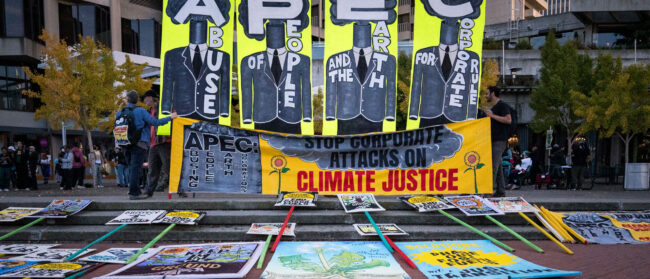In September 2017, the International Chamber of Commerce (ICC), an organisation that represents the interests of global businesses in intergovernmental meetings, was granted Observer status at the United Nations (UN) General Assembly. This marks the first time that a private sector group has been formally admitted into the UN system.
The ICC praised this move as a step towards inclusivity and increasing engagement of the private sector, particularly in the realm of climate action. “Business is central to national climate action plans that will affect domestic and international operations, supply chains, planning and investments,” the group said in a statement.
This last November, global leaders and climate negotiators met in Bonn, Germany for COP 23, which is a series of high-level climate talks that seeks to tackle climate change through negotiations between governments. The conference’s main objective for this year was to craft the rulebook for the implementation of the Paris Agreement.
12 December marks the two-year anniversary of the signing of the #ParisAgreement. This year, global leaders will meet in #Paris to reaffirm their #climateaction commitments during the #OnePlanet Summit https://t.co/V08JMpQhA4 Vid by @WorldBank pic.twitter.com/xWTJmOnOVL
— UN Climate Change (@UNFCCC) December 6, 2017
A conflict of interest clause
To be able to take the loss and damage agenda further in climate policymaking, there is a need to disengage private sector interest in the climate talks, CAI said.
While businesses and private sector organisations have a role to play in global climate action, there should be an imperative for the United Nations Framework Convention on Climate Change (UNFCCC) to disallow their participation in the highest level of climate negotiations. The UN organisation must invoke a conflict of interest clause, where groups with interests that run contrary to the goals of the talks shouldn’t be allowed to participate in the talks, CAI added.
The World Health Organization created a similar policy to preserve the integrity of its discussions on tobacco control in 2003. “Government must reclaim its role as the arbiter of corporate behaviour. For too long, corporations have eroded governmental power and convinced people that individual actions are the solution to the climate crisis,” Brag said.
As the irreversible costs of climate change continue to destroy communities and take the lives of people who had no hand in the climate crisis, a thorough evaluation of the UNFCCC’s rhetoric of inclusivity is imperative.
Alanah Torralba is an independent journalist based in the Philippines and writes for Climate Tracker, an organisation that trains up-and-coming climate change journalists on how to cover UN climate negotiations. She currently reports on road safety, the disability sector and climate change.


